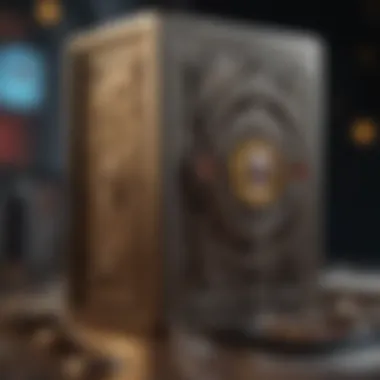Unlocking the Intriguing Value of Magic Deckmaster Cards: A Deep Dive


Overview of Magic: The Gathering Deckmaster Cards
Magic: The Gathering deckmaster cards stand as the epitome of collectible card games, transcending mere pieces of cardstock to hold significant monetary and sentimental value in the eyes of collectors and players alike. These intricate cards showcase not only intricate artwork and design but also a complex market dynamic that influences their value. Delving into the intricacies of these cards unveils a world where rarity, condition, demand, and gameplay utility all intersect to determine their worth.
Factors Influencing Card Value
Diving deeper into the realm of Magic deckmaster cards reveals a multitude of factors influencing their value and desirability. From the evident rarity of a particular printing to the condition of the card itself, each element plays a crucial role in shaping the card's overall value. The card's playability in various formats, such as Standard, Modern, or Commander, further adds layers to its worth, as highly sought-after cards for competitive play often command higher prices.
Navigating the Market Landscape
Understanding the market landscape of Magic: The Gathering deckmaster cards requires a keen eye for market trends, auction dynamics, and the psychology behind collector behavior. From observing price fluctuations based on tournament results to identifying undervalued cards with potential for growth, navigating this intricate market necessitates a mix of expertise and intuition. Collectors and players can leverage online marketplaces, specialty forums, and expert appraisals to stay informed and make strategic decisions when buying, selling, or investing in deckmaster cards.
Evaluating Card Authenticity and Grading
Ensuring the authenticity and condition of Magic deckmaster cards is paramount when assessing their value and potential investment returns. From scrutinizing card surfaces for imperfections to verifying scarce printings and editions, collectors need to possess a discerning eye for detail and a solid understanding of the grading standards set by professional card grading services. By investing in graded cards with reputable authentication, collectors can mitigate the risks associated with counterfeit cards and maximize the value of their card collections.
Conclusion
Introduction
Delving into the vast universe of Magic: The Gathering deckmaster cards unveils a realm of intrigue and value that transcends traditional collectibles. In this article, we embark on a journey to unravel the mysteries surrounding these captivating cards, shedding light on their inherent worth and potential significance within the realm of gaming and collectibles. By delving into the nuanced intricacies of Magic: The Gathering deckmaster cards, we aim to equip both enthusiasts and investors with the knowledge and insights needed to navigate this intricate landscape of card trading and collection effectively.
Understanding Magic Deckmaster Cards
Exploring the origins of Magic: The Gathering allows us to trace the roots of these iconic deckmaster cards to their inception. Originating as a strategic trading card game, Magic: The Gathering revolutionized the gaming industry with its innovative gameplay mechanics and captivating card artistry. The evolution of Magic: The Gathering over the years has solidified its position as a pillar of the gaming world, attracting a dedicated following of players and collectors alike. Understanding the origins of Magic: The Gathering provides crucial context to grasp the intrinsic value and historical significance of deckmaster cards.
Highlighting the magnitude of deckmaster cards in the gaming landscape showcases their pivotal role in shaping the gaming community. These cards serve as more than just tools for gameplay; they embody a fusion of art, strategy, and storytelling, captivating players with their intricate designs and strategic importance. The significance of deckmaster cards extends beyond their collectible nature, offering a bridge between players, collectors, and the expansive world of Magic: The Gathering.
Market Dynamics


Examining the economic factors driving the value of deckmaster cards sheds light on the underlying forces guiding the card trading market. Economic considerations, such as card scarcity, demand trends, and market speculation, play a pivotal role in determining the value of individual cards and card sets. Understanding these economic factors equips collectors and investors with the knowledge needed to make informed decisions in a volatile trading market.
The collectible nature of deckmaster cards elevates them beyond mere gaming assets, transforming them into coveted artifacts prized by enthusiasts and investors alike. This collectible appeal stems from a combination of artistic creativity, gameplay relevance, and historical significance, creating a dynamic ecosystem where cards possess both intrinsic and extrinsic value. Recognizing the collectible nature of deckmaster cards is essential for navigating the market with a keen eye for value and potential growth.
Importance of Rarity
Delineating between rare and common cards unveils the intricate balance between scarcity and value within the realm of deckmaster cards. Rare cards, with their limited availability and unique attributes, hold a special allure for collectors seeking exclusivity and prestige in their card collections. The rarity of these cards not only adds to their mystique but also contributes significantly to their market value, often commanding premium prices in trading circles.
The impact of rarity on the value of deckmaster cards is a central tenet of card evaluation and appraisal. Understanding how rarity influences card pricing and market demand is crucial for both collectors and investors looking to maximize the return on their card investments. By assessing the impact of rarity on card value, individuals can strategically navigate the market, identifying valuable cards and capitalizing on emerging trends with a discerning eye.
Factors Influencing Value
Understanding the significance of factors influencing the value of Magic Deckmaster cards is paramount in navigating the intricate world of collectibles. The interplay between various elements such as condition, edition, and demand directly impacts the market dynamics. By comprehensively analyzing these factors, collectors and players can make informed decisions to maximize the value of their card collections.
Condition of Cards
Mint Condition
The concept of achieving a Mint Condition with Magic Deckmaster cards is a pursuit treasured by enthusiasts. Obtaining cards in pristine condition, devoid of imperfections or wear, can significantly elevate their desirability and market value. Mint-condition cards boast impeccable edges, corners, and surfaces, signaling superior preservation. The appeal of Mint Condition lies in its rarity and the assurance it provides of the card's untouched state, making it a preferred choice for serious collectors keen on maintaining the highest standards of quality.
Grading Standards
Delving into the realm of grading standards delves deeper into the evaluation process of card conditions. These standards serve as benchmarks to objectively assess the quality of Magic Deckmaster cards. By adhering to established grading criteria, collectors can ensure consistency and accuracy in determining the condition of their cards. While grading standards bring standardization to the valuation process, they also introduce subjectivity that can influence the perceived value of cards. Understanding the nuances of grading standards is essential for collectors aiming to navigate the market with precision and confidence.
Edition and Age
Alpha, Beta, Unlimited
The distinction between Alpha, Beta, and Unlimited editions of Magic Deckmaster cards holds intrinsic value based on their historical significance and scarcity. Alpha, being the initial release, commands attention for its limited availability and status as a pioneer set. Beta follows closely, mirroring Alpha with slight variations, while the Unlimited edition caters to a broader audience with increased print runs. Collectors often gravitate towards these early editions for their historical importance and potential for appreciation over time. Choosing between these editions involves weighing historical prestige against availability and personal preferences.


Older vs. Modern Sets
Evaluating the merits of older versus modern sets involves appraising the evolution of card design, gameplay dynamics, and collectible trends. Older sets like Alpha and Beta carry nostalgia and historical significance, appealing to collectors seeking authenticity and rare finds. In contrast, modern sets introduce innovations in card mechanics and themes, catering to contemporary sensibilities and gameplay preferences. Deciding between older and modern sets necessitates a balance between sentimentality, collectible value, and engagement with current gaming trends.
Playability and Demand
Metagame Relevance
The concept of metagame relevance underscores the impact of card interactions on evolving gameplay strategies and competitive environments. Cards that exhibit metagame relevance influence deck-building decisions, tournament outcomes, and player preferences. Recognizing the metagame relevance of cards allows players to anticipate trends, adapt strategies, and capitalize on emerging opportunities within the gaming community. Investing in cards with strong metagame relevance can enhance one's competitive edge and overall gaming experience.
Tournament Performance
Analyzing the tournament performance of Magic Deckmaster cards sheds light on their competitive viability and strategic value. Cards that consistently excel in tournament settings garner attention for their adaptability, synergy with popular strategies, and overall impact on game outcomes. Understanding the tournament performance of cards equips players with insights into competitive trends, deck optimizations, and investment potentials. Engaging with cards known for stellar tournament performance can enrich gameplay experiences and contribute to long-term growth in card value.
Navigating the Market
Authentication and Verification
Certification Processes: In the realm of Magic Deckmaster Cards, certification processes hold substantial significance. These procedures assure collectors of the authenticity and quality of their cards. The meticulous process of certification sets a high standard for verifying the legitimacy of trading cards. This method is a popular choice as it provides a sense of security and trust to both buyers and sellers within this niche market. While certification processes offer a strong safeguard against counterfeit cards, they might entail additional costs and processing time.
Identifying Counterfeits: A critical aspect of safeguarding the value of Magic Deckmaster Cards is the skill of identifying counterfeits. This practice demands a keen eye and an understanding of distinguishing features that set authentic cards apart from fakes. The ability to spot counterfeits is essential for protecting investments and maintaining the integrity of one's collection. While adeptly identifying counterfeits can thwart potential losses and fraud, it requires ongoing vigilance and expertise, adding a layer of complexity to the collecting process.
Investing Strategies
Long-Term vs. Short-Term: Deciding between long-term and short-term investment strategies is a key consideration for individuals engaging with Magic Deckmaster Cards. Long-term investments offer the promise of gradual appreciation and stability, often rewarding patient investors. On the contrary, short-term strategies may yield quicker returns but come with higher risks. Choosing between these approaches necessitates a thorough understanding of market trends and individual risk tolerance. Each strategy presents its own advantages and disadvantages, shaping the investment landscape for collectors and players alike.
Diversification: Diversification stands out as a pivotal aspect of investment strategies within the realm of Magic Deckmaster Cards. Spreading investments across a range of cards or sets can mitigate risks associated with market fluctuations. This approach enhances portfolio resilience and offers protection against downturns in specific card values. While diversification minimizes vulnerabilities, it also requires a nuanced balancing act to optimize returns and manage variances in card performances over time.
Engaging with the Community


Forums and Discussion Groups: Engaging with forums and discussion groups forms a cornerstone of the Magic Deckmaster Cards community. These platforms provide spaces for enthusiasts to share insights, ask questions, and exchange information on card valuation and gameplay strategies. Participation in forums cultivates a sense of camaraderie and fosters learning opportunities among collectors and players. While forums offer valuable networking prospects, users must exercise caution regarding misinformation and subjective opinions that may influence decision-making.
Networking and Trading: Networking and trading play a pivotal role in expanding one's collection and establishing connections within the Magic Deckmaster Cards community. Through networking, individuals can forge valuable relationships with other collectors and traders, facilitating the exchange of cards and knowledge. Trading not only enables the acquisition of sought-after pieces but also opens doors to new insights and trends in the market. While networking and trading present exciting opportunities, practitioners must navigate potential risks such as counterfeit cards and speculative deals to safeguard their investments and reputation within the community.
Conclusion
Maximizing Value
Leveraging Knowledge
Leveraging knowledge presents itself as a pivotal factor in amplifying the value of Magic Deckmaster Cards. This segment delves into the precise utilization of expertise and insights to gain a competitive edge in the market. By harnessing knowledge effectively, stakeholders equip themselves to make astute decisions concerning investments and acquisitions. The proficiency in discerning the subtle distinctions between various cards and editions empowers enthusiasts to craft a portfolio with promising long-term potential. However, navigating this realm requires a keen eye for detail and a willingness to stay abreast of evolving trends and developments to capitalize on emerging opportunities.
Adapting to Market Trends
Adapting to market trends emerges as a strategic maneuver essential for optimizing the value of Magic Deckmaster Cards. This section navigates the volatile landscape of market fluctuations, urging participants to acclimate swiftly to changing dynamics. By embracing flexibility and staying attuned to fluctuating demands, individuals can position themselves advantageously to exploit sudden surges in specific card values. However, this adaptability mandates a delicate balance between caution and calculated risk-taking, ensuring that investments align harmoniously with the prevailing market sentiments to yield favorable returns.
Preserving Investments
Storage and Protection
The domain of Magic Deckmaster Cards necessitates meticulous attention to storage and protection mechanisms to safeguard investments effectively. Proper storage not only shields cards from physical deterioration but also preserves their condition, consequently enhancing their market value. Implementing appropriate protective measures, such as storing cards in climate-controlled environments and utilizing archival sleeves, is imperative for insulating valuable collections from potential damage or degradation. Nonetheless, the meticulous upkeep demanded by such practices underscores the dedication required to curate a collection resilient to the passage of time.
Insurance Considerations
Strategically integrating insurance considerations into the realm of Magic Deckmaster Cards adds an invaluable layer of protection to investments. This facet discusses the merits of securing comprehensive coverage to mitigate risks associated with unforeseen circumstances. By engaging with reliable insurance providers and crafting tailored policies, collectors and players can hedge against potential losses stemming from theft, damage, or other unforeseeable events. However, navigating the complexities of insurance entails a thorough understanding of policy terms and conditions to ensure adequate protection without unduly inflating operational costs.
Future Prospects
Evolution of the Market
The evolution of the market stands as a transformative force shaping the trajectory of Magic Deckmaster Cards' valuation. This segment explores the iterative nature of the market, delineating how trends, player preferences, and design innovations collectively influence card values over time. By comprehending the underlying currents steering market evolution, stakeholders equip themselves to anticipate shifts in demand and capitalize on emerging opportunities. Yet, this foresight necessitates a continuous commitment to monitoring market trends and adapting strategies proactively to align with the ever-evolving landscape of card valuation.
Innovations in Card Design
Innovations in card design represent a compelling conduit for augmenting the value proposition of Magic Deckmaster Cards. This segment scrutinizes the significance of novel design elements, mechanics, and aesthetics in revitalizing interest and demand for specific cards. By embracing innovative design paradigms and staying apprised of cutting-edge developments in the realm of card design, players and collectors can identify future collectibles poised for ascendancy in the market. Nevertheless, discerning the intrinsic value of design innovations mandates a discerning eye and a comprehensive appreciation for the evolving tastes and preferences of the target audience.



